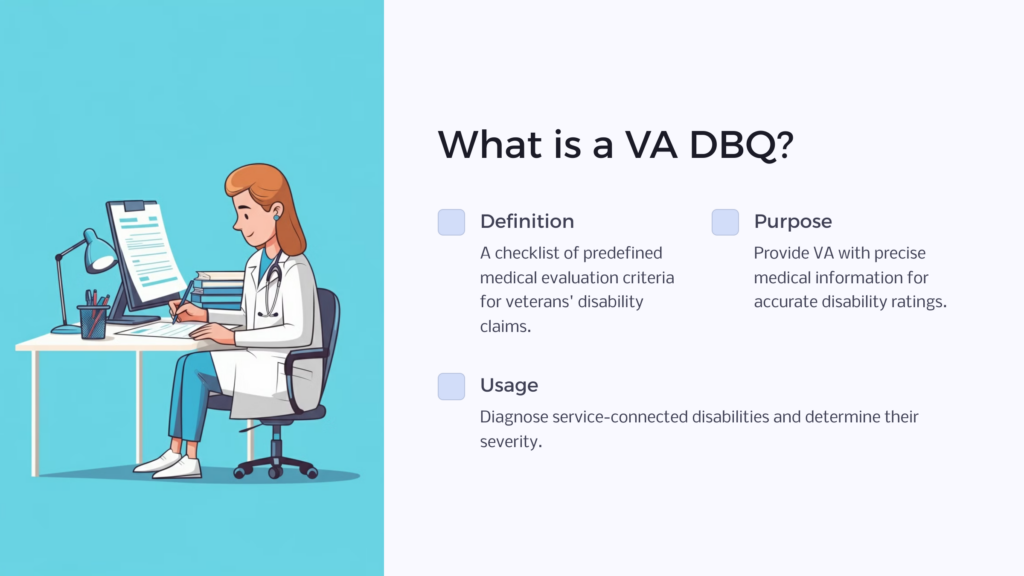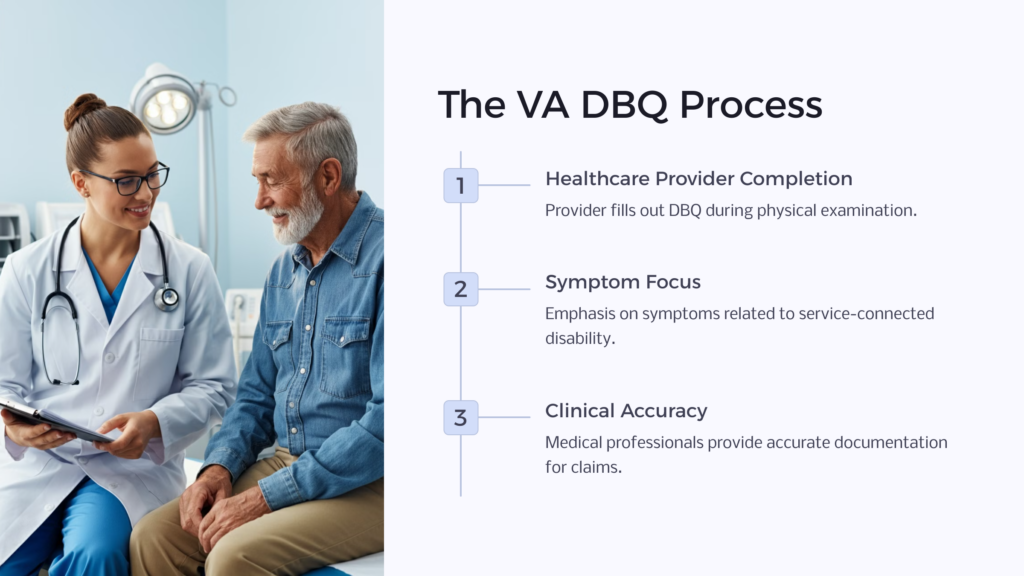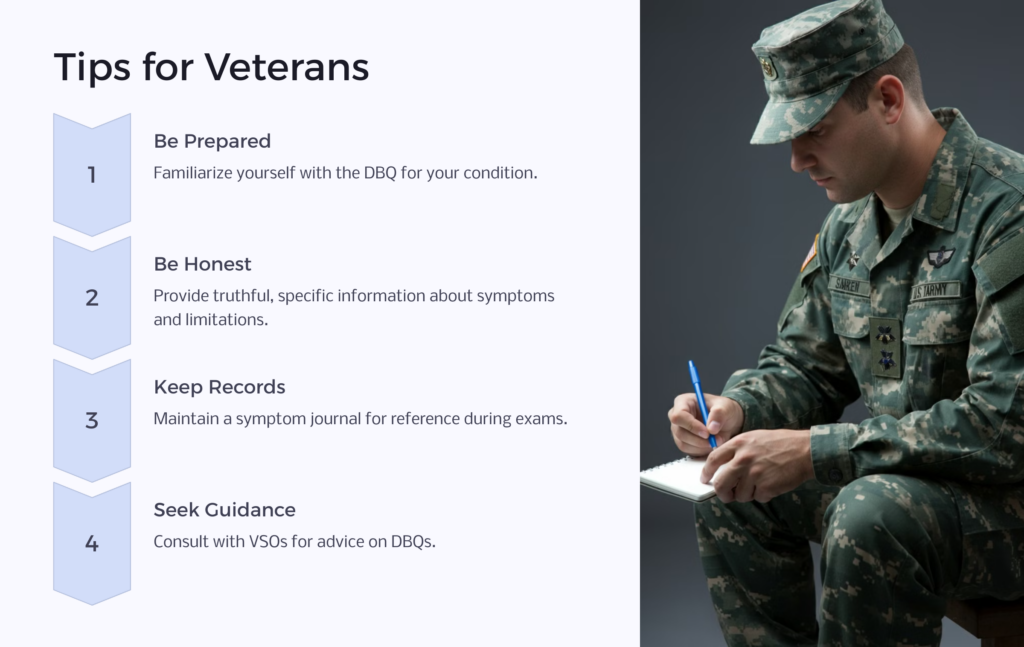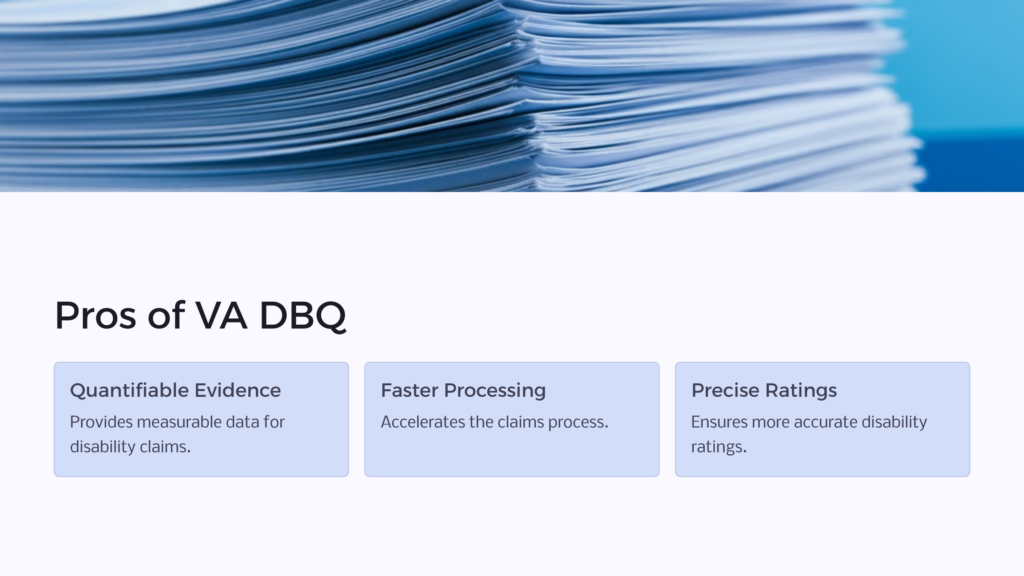The Department of Veterans Affairs’ Disability Benefits Questionnaires (DBQs) are crucial tools in procuring disability benefits for veterans. The VA DBQ forms provide a standardized method for medical professionals to record the extent of a veteran’s disability. The data gleaned from these forms guide the VA’s decision-making process and impacts the overall speed and accuracy of VA disability claims.
Comprehensive Understanding of VA DBQ

The VA DBQ is a checklist of predefined medical evaluation criteria that serves as an essential component for veterans’ disability benefit claims. They consist of a series of questions for healthcare providers to evaluate the veteran’s health conditions that could potentially relate to a service-connected disability. The central purpose of the VA DBQ is to provide the VA with precise, detailed medical information to ensure an accurate VA disability rating and improve the timeliness of claims processing.
Importance of the VA DBQ
Being such an integral part of the VA disability claim process, the VA DBQ plays several important roles. It is used to diagnose whether the veteran’s disability is connected to their service time, determine the severity of the disability and therefore the VA disability rating, and evaluate if the condition has worsened over time. The answers given within the DBQ greatly influence the VA’s decision-making process, impacting the amount of benefits a veteran receives, and how quickly a decision can be made.
Components of the VA DBQ Form
The VA DBQ form consists of multiple sections that each serve a unique role in comprehensively assessing a veteran’s physical or mental health condition. Key sections include:
- Medical history – Documents the veteran’s health background, pre-existing conditions, injuries/events in service, and post-service symptoms and treatment. Provides critical context for evaluating disability etiology.
- Examinations – Logs clinical exams performed to objectively identify current signs and symptoms of claimed conditions. Allows comparison to baseline health documented in service records.
- Diagnostic testing – Includes results from imaging, laboratory tests, and other diagnostics used to validate diagnoses and assess severity. Provides objective medical evidence complementing exam findings.
- Diagnosis – Lists all validated current diagnoses pertaining to claimed disability, formulated based on accumulated medical data. Establishes clear impairment requiring compensation.
- Functional impact – Describes effects of diagnosed conditions on veteran’s occupational and daily activity capacity. Helps determine appropriate disability rating percentage.
Each section compiles data that significantly contributes to evaluating the extent of a disability, its effect on the veteran’s life, and establishing a clear link between the disability and the veteran’s military service. The comprehensive approach allows for an accurate, evidence-based determination of disability status and compensation level.
Understanding the VA DBQ Process

The VA DBQ process, though complex, follows a structured pathway. Primarily, the veteran’s healthcare provider must complete the DBQ. During the physical examination, the provider will fill out the DBQ form, focusing on the symptoms and limitations that could be connected to a service-related disability. Medical professionals play an indispensable role in this process, providing a clinically accurate document that forms the foundation of the veteran’s disability claim.
Tips for Veterans

Dealing with VA DBQ can be challenging for veterans. Honesty and specificity are crucial when discussing symptoms and limitations during medical evaluations. Veterans must familiarize themselves with the DBQ related to their condition, giving themselves the best chance of a successful claim. It is also advisable for veterans to utilize a healthcare professional familiar with the VA claim process and capable of accurately filling out a DBQ.
• Read through the DBQ for your condition carefully and ensure you understand the terminology and rating criteria. Prepare specific examples of how your symptoms impact your daily functioning.
• Be completely truthful about your symptoms, even if it’s embarrassing. Downplaying limitations can negatively impact your rating.
• Keep a symptom journal tracking duration, severity, and functional impact over a 2-week period. Bring this to your C&P exam for reference.
• Ask your VSO to provide advice on DBQs. They can help explain what raters are looking for in responses.
• Schedule exams with physicians experienced in disability claims. They understand what details the rater needs to see in the DBQ.
• Follow up after the exam to ensure the filled-out DBQ accurately captures your disabilities and limitations. Make an appeal if you feel the rating is wrong.
Pros and Cons of VA DBQ

While the VA DBQ process offers many advantages, including providing quantifiable evidence for disability claims, accelerating the claims process, and ensuring more precise disability ratings, it is not without its drawbacks. Some critics argue that DBQs tend to oversimplify complex medical conditions and limit the ability of healthcare providers to fully express their professional judgment. Others say they may discourage thorough examinations or overlook non-service related disabilities that nonetheless affect the veteran’s overall health.
Conclusion
Understanding the VA DBQ is integral for any veteran looking to process their disability claim. While the complexities of the procedure may seem daunting, veterans must take an active role in understanding the importance of the DBQ to their claims. Being properly informed will not only help veterans complete the DBQ process effectively but also allow them to take charge of their health and wellbeing.
 Benefits.com Advisors
Benefits.com Advisors
With expertise spanning local, state, and federal benefit programs, our team is dedicated to guiding individuals towards the perfect program tailored to their unique circumstances.
Rise to the top with Peak Benefits!
Join our Peak Benefits Newsletter for the latest news, resources, and offers on all things government benefits.



















